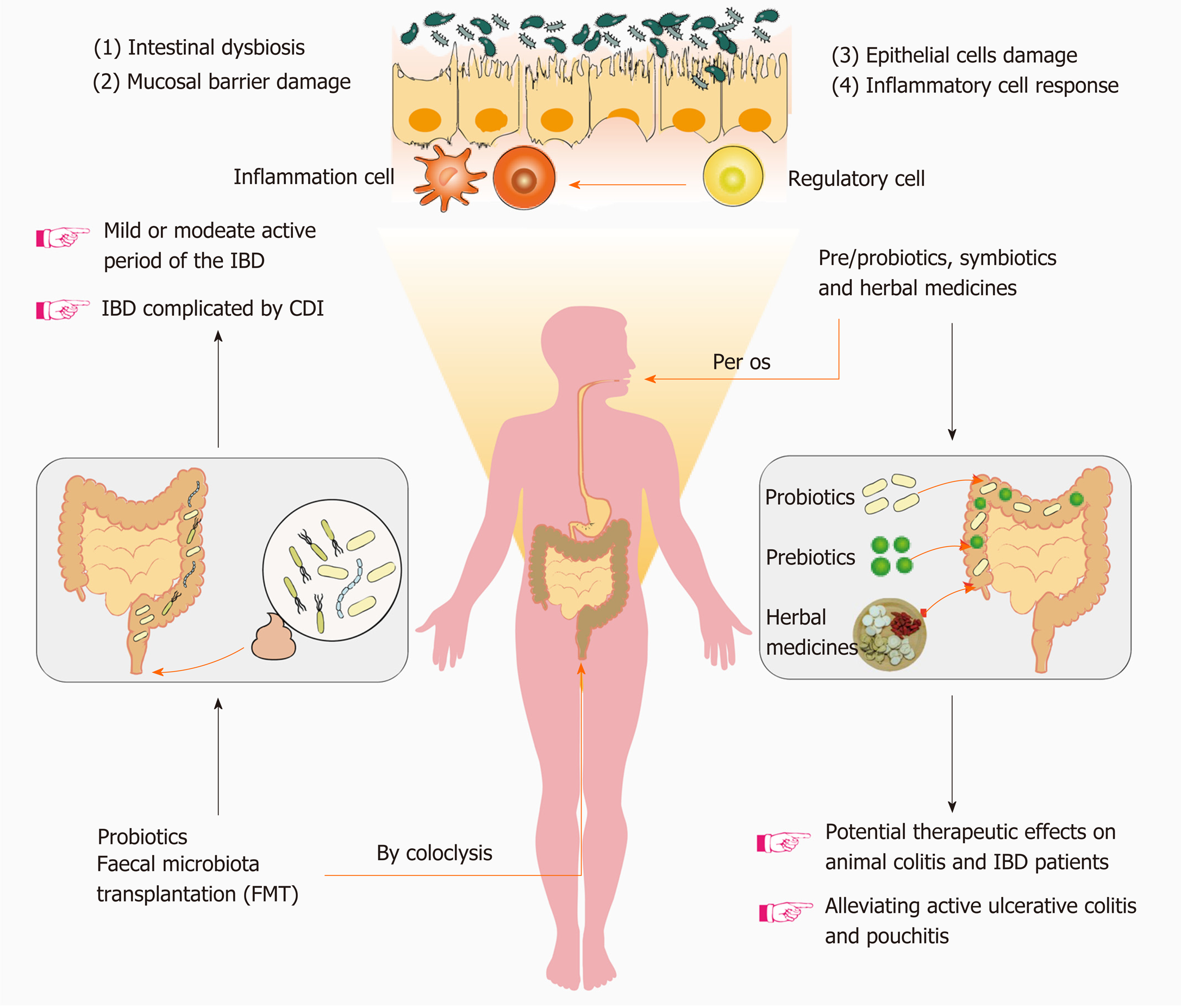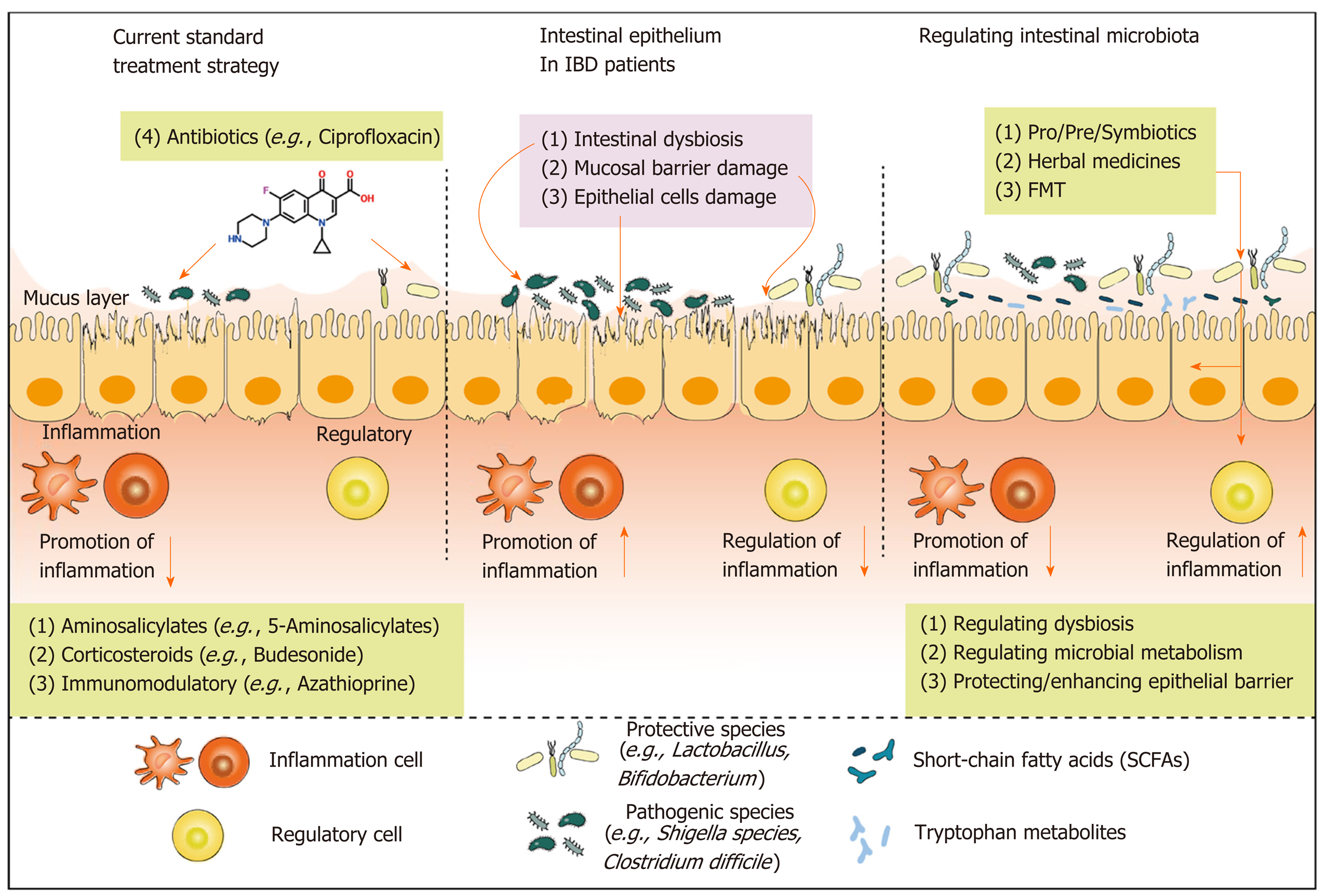Copyright
©The Author(s) 2020.
World J Gastroenterol. Aug 14, 2020; 26(30): 4378-4393
Published online Aug 14, 2020. doi: 10.3748/wjg.v26.i30.4378
Published online Aug 14, 2020. doi: 10.3748/wjg.v26.i30.4378
Figure 1 Regulation of intestinal microbiota as a therapeutic strategy for inflammatory bowel disease.
Microbe-based therapies for inflammatory bowel disease (IBD) can be divided into two categories, namely: Direct regulation of microbiota [probiotics and fecal bacteria transplantation (FMT)] and indirect regulation (prebiotics and herbal medicines). Intestinal dysbiosis, mucosal barrier damage, epithelial cell damage and inflammatory cell response often coexist in patients with IBD. However, FMT has now been used to test the treatment of mild or moderate active period of IBD as well as IBD patients complicated by Clostridium difficile infection. Pre/probiotics, symbiotics and herbal medicines display potential therapeutic effects in animal colitis as well as certain IBD patients, especially for active ulcerative colitis. Hence, it is necessary to screen and design personalized microbiota-based therapies in order to enhance the specificity and selectivity of the therapeutic strategy targeting intestinal microbiota. IBD: Inflammatory bowel disease; FMT: Fecal bacteria transplantation; CDI: Clostridium difficile infection.
Figure 2 Primary mechanisms of standard treatment strategy and regulating intestinal microbiota strategy for inflammatory bowel disease.
Current standard therapeutic medications for inflammatory bowel disease (IBD) are antibiotics (e.g., ciprofloxacin), aminosalicylates (e.g., 5-aminosalicylates), corticosteroids (e.g., budesonide) and immunomodulatory agents (e.g., azathioprine), and the mechanism mainly involves inhibiting the development of inflammation in the intestine. Intestinal dysbiosis is often found in IBD patients, which is manifested in higher abundance of pathogenic species (e.g., Shigella species and C. difficile) and less abundance of protective species (e.g., Lactobacillus and Bifidobacterium). However, interventions targeting intestinal microbiota, such as probiotics, prebiotics, symbiotics, herbal medicines and fecal bacteria transplantation exert therapeutic action primarily through the mechanism of correcting dysbiosis. Furthermore, the treatment strategy of regulating intestinal microbiota are also involved in regulating microbial metabolisms (e.g., short-chain fatty acids and tryptophan metabolites), and protecting/enhancing the intestinal epithelial barrier. IBD: Inflammatory bowel disease; FMT: Fecal bacteria transplantation.
- Citation: Yue B, Yu ZL, Lv C, Geng XL, Wang ZT, Dou W. Regulation of the intestinal microbiota: An emerging therapeutic strategy for inflammatory bowel disease. World J Gastroenterol 2020; 26(30): 4378-4393
- URL: https://www.wjgnet.com/1007-9327/full/v26/i30/4378.htm
- DOI: https://dx.doi.org/10.3748/wjg.v26.i30.4378










